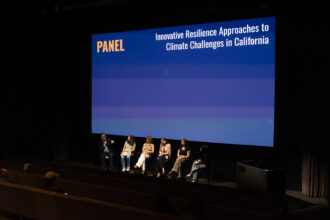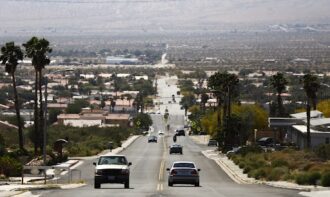by Chase Engelhardt, Climate Planning & Resilience Coordinator
The American conception of masculinity goes beyond fine print on hygiene products to substantial things, including climate change.
The journalist, Emily Atkin, recently described some ways that toxic masculinity mixes with climate denialism in extremist groups like the Proud Boys, which she dubs “petro-masculinity”. But toxic masculinity isn’t exclusive to the far right. It can be found anywhere, even here in L.A.
One noticeable example is car culture. In California we’re no strangers to the four-wheeled machines that generate the majority of the state’s greenhouse gas emissions. The bigger, louder, less efficient, and faster a car is, the more ‘masculine’ it’s advertised to be. Cars are the manspreading of the urban fabric—they emphasize taking up space, making oneself larger, louder, and often more aggressive.
This “size matters” ideology has sparked an arms race in car size that affects people across the gender spectrum. Safety features are often marketed to women and families, even though men are disproportionately more likely to cause traffic collisions (60% of them in LA). Here we see responsibility placed onto the victims as we increase the size of our vehicles, as well as take space away from those who cannot afford them or choose not to use them. By shifting responsibility and not addressing the underlying culture or infrastructure that are causing accidents, we’ve allowed the problem to grow substantially.
The takeaway here isn’t simply that “big car = bad,” but rather that we have a huge opportunity to address two issues at once: Greater intersectionality within the climate movement is pivotal to its success. And, just as racial justice is fundamental to climate work, so too is understanding the role of gender.
We need to understand that if a woman is scared of being harassed on a bus, that’s a climate problem. We need to understand that if a trans woman or gender non-conforming person avoids biking, walking, or transit for fear of violence, that’s a climate issue, as well.
To address this and other issues, the activists behind All We Can Save argue that “we need an upwelling of transformational climate leadership that is more characteristically feminine and more faithfully feminist, rooted in compassion, connection, creativity, and collaboration.” And I agree.
Imagine waking up in a Los Angeles that has a more caring culture. Imagine that you can ride a bike without feeling like drivers want to harm you. Imagine that the air is clean. Imagine you have the freedom to choose how you want to move around the city. In this LA, the built environment is built for people instead of cars. No person is unhoused.
If we can center those who have been most marginalized, we can build momentum for a brighter future. Here’s to cultivating newer, more inclusive cultures and working together for a healthier new year.




